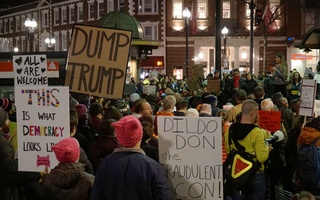{shortcode-1b69f8f234aecb0a5a7c4f7ea4b6d35f4df4b0ec}
After the federal government announced it would suspend fast-track processing for H-1B visas, Harvard administrators are scrambling to process visas for some scholars and warn that the suspension could have “serious effects” on faculty hiring.
At the beginning of March, U.S. Citizenship and Immigration Services announced that it will no longer offer premium processing for the non-immigration visas—which allow employers to temporarily hire high-skilled workers—for up to six months beginning April 3.
Maureen Martin, director of immigration services at the Harvard International Office, said her office files between 150 and 200 H-1B visas each year through premium processing, which allows employers to pay a fee to expedite visa acquisition to 15 days. The bulk of these visas go to faculty members.
While Harvard has spent the last two months forcefully opposing President Donald Trump’s immigration orders, this more subtle bureaucratic change may similarly jeopardize the mobility and employment of scores of Harvard affiliates.
In an email to international affiliates and departments, HIO warned academic departments that the suspension of premium processing might delay the hiring of employees on H-1B visas.
“If your department plans to hire faculty or researchers on H-1B visas for July 1 or for the new Fall semester start date, please know that this suspension may affect our ability to obtain timely visa sponsorship,” the email reads. “We strongly suggest that your department discuss all outstanding hires and determine if this action may affect your hiring plans.”
According to the March 3 USCIS announcement, the upcoming suspension is intended to allow the agency to reduce the backlog of applications to “help us to reduce overall H-1B processing times.”
At a Faculty meeting earlier this month, University President Drew G. Faust told faculty members she is “very concerned” about the suspension of premium processing.
“This change in policy could have serious effects on the University’s ability to bring international researchers and faculty to campus in a timely manner,” she said. “The thousands of individuals who come to our campus from around the globe each year are essential to who we are and what we do."
Without premium processing, visa applications can take months for USCIS to process. For new hires, this waiting period could delay their ability to travel to the United States by a designated start date. And scholars already at Harvard looking to renew their visas will be allowed to remain in the country while their documents are being processed, though they will not be able to work after a grace period of 240 days or travel internationally.
The USCIS announcement left the HIO less than a month to file as many H-1B applications for premium processing as possible before the April 3 deadline. The process, which requires departments to submit information and fees to the HIO, typically takes two to three months. Only one person in the HIO works exclusively on faculty cases.
The HIO has filed more than 80 applications since the USCIS announced the procedural change, according to Martin, who said the office will continue to file even after the suspension takes effect on April 3.
English Department chair W. James Simpson wrote in an email that the change has delayed hiring in the department.
“The suspension of premium processing is holding up potential hires: we are unable to guarantee to a potential hire now that their start date will be September,” Simpson wrote.
Science departments in FAS, the School of Public Health, and the Medical School have a higher proportion of H-1B holders, according to the HIO.
Christian Suharlim, President of the Postdoctoral Association at the School of Public Health, said that many researchers at the school are international and rely on the H-1B visa. Suharlim is one such researcher, and without premium processing, he will be unable to travel while the USCIS reviews his documents.
“My work is on low- and middle-income countries, so I need the international travel and I do a lot of teaching internationally as well,” Suharlim said.
Medical School professor Thomas Michel said H-1B holders work in labs at the Medical School and at Harvard-affiliated teaching hospitals such as Massachusetts General Hospital and Brigham and Women’s Hospital. The USCIS suspension could impact research across the Boston area, he said.
The Association of American Universities, of which Harvard is a member, wrote a letter to Lori Scialabba, acting director of USCIS, arguing the suspension of premium processing would hinder universities’ efforts to hire professors and researchers from abroad.
“Without the option for premium processing, many universities currently in the midst of hiring negotiations will not be able to have their international employees begin work until mid-semester at best, potentially leaving classes stranded without professors,” the letter reads.
Several scholars on H-1B visas declined to comment for this article, citing fears that doing so might jeopardize their chances of visa renewal.
—Staff writer Caroline S. Engelmayer can be reached at caroline.engelmayer@thecrimson.com. Follow her on Twitter @cengelmayer13.
—Staff writer Claire E. Parker can be reached at claire.parker@thecrimson.com. Follow her on Twitter @ClaireParkerDC.Read more in University News
In Ho Chi Minh City, Faust Reflects on Vietnam WarRecommended Articles
-
H-1B Program Harmful To American WorkersTo the editors: Re: “Not Enough Visas,” editorial, Oct. 10. I wrote software for many years, but quit early in
-
Extending America's WelcomeImagine yourself as a graduating senior who just landed a posh job, say at a consulting firm, investment bank, or
-
Work Visas in Short SupplyWhile the rest of the Class of 2007 coasts through a post-thesis spring, the senior class’s international students have yet
-
New Visa Policy Aids International STEM StudentsFor Harvard's international students, remaining in the United States after graduation can be complicated.
-
 Harvard Affiliates Protest Revised Immigration Ban
Harvard Affiliates Protest Revised Immigration Ban













